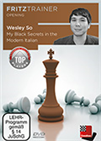Ranked number 4 in the world
 Back in 2019, Wang Hao won the inaugural edition of the Grand Swiss with an 8/11 score. After eight rounds, the Chinese grandmaster was one of ten players standing a half point behind three co-leaders — David Anton, Levon Aronian and Fabiano Caruana were sharing first place on 6/8 points. In this year’s edition, Alireza Firouzja is leading the event with 6½ points after eight rounds, a full point ahead of ten players. Most likely, draws in the final three rounds will grant the 18-year-old a spot in the 2022 Candidates Tournament.
Back in 2019, Wang Hao won the inaugural edition of the Grand Swiss with an 8/11 score. After eight rounds, the Chinese grandmaster was one of ten players standing a half point behind three co-leaders — David Anton, Levon Aronian and Fabiano Caruana were sharing first place on 6/8 points. In this year’s edition, Alireza Firouzja is leading the event with 6½ points after eight rounds, a full point ahead of ten players. Most likely, draws in the final three rounds will grant the 18-year-old a spot in the 2022 Candidates Tournament.
Firouzja’s great performance has gained him 14.2 rating points, which allowed him to climb to fourth place in the live ratings list. The youngster will face perhaps his biggest challenge in Friday’s round 9, as he is paired up against rating favourite Fabiano Caruana, who beat Nils Grandelius with black on Thursday. Remarkably, Caruana is rated only 5.8 points higher than the tournament’s leader (for comparison’s sake, six months ago, Caruana had a 61-point advantage over Firouzja in the official FIDE ranking).
 On this DVD Dorian Rogozenco, Mihail Marin, Oliver Reeh and Karsten Müller present the 8. World Chess Champion in video lessons: his openings, his understanding of chess strategy, his artful endgame play, and finally his immortal combinations.
On this DVD Dorian Rogozenco, Mihail Marin, Oliver Reeh and Karsten Müller present the 8. World Chess Champion in video lessons: his openings, his understanding of chess strategy, his artful endgame play, and finally his immortal combinations.While Firouzja is now a favourite to get one of the two spots in the Candidates, the fight for the second spot is wide open, with ten players currently tied on 5½ points. Besides Caruana, Nikita Vitiugov, David Howell, Grigoriy Oparin, David Anton, Samuel Sevian, Anton Korobov and Alexandr Predke all won in an eventful round 8 to increase their chances of leaving Riga with a ticket to the next edition of the Candidates.
...54 boards

Alexandr Predke beat Aryan Tari with the white pieces | Photo: Anna Shtourman
It was two tough pairings in a row for Sasikiran in Riga, as he came from drawing Maxime Vachier-Lagrave before facing an in-form Firouzja with the black pieces. The players followed theory until move 13 out of an Italian, replaying the moves played by MVL and Dariusz Swiercz at this year’s edition of the Sinquefield Cup.
Although Swiercz lost that game with black, his 13...Bb6 was not the culprit. Sasikiran apparently mixed something up in his preparation though, as his choice of 13...f5 — which he played after thinking for over 15 minutes — was a mistake.
Black’s daring move allows 14.Neg5, after which Sasikiran spent more than 20 minutes on 14...h6 (14...Qf6 was better).
Firouzja correctly assessed that he had a big chance to score yet another win and carefully considered his next three moves, deducting over 40 minutes off his clock to play 15.Ne6 Qf6 16.Nxf8 Rxf8 17.d4
 The Italian Game is considered a sound but quiet opening without early trades, giving rise to rich positions where plans are more important than forced variations. So shows black's plans on this DVD.
The Italian Game is considered a sound but quiet opening without early trades, giving rise to rich positions where plans are more important than forced variations. So shows black's plans on this DVD.
White has the initiative and plays energetically. Sasikiran responded with 17...e4, and after 18.dxc5 Nde5 saw his opponent finding 19.Nxe5, giving up his queen.
After 19...Bxd1 20.Nd7 Qd8 21.Bxc6 there is little hope for Black, especially while facing a tactician of Firouzja’s calibre. Sasikiran tried to defend his position until move 43, when he finally threw in the towel.

David Howell got the better of Andrey Esipenko | Photo: Anna Shtourman
There was no shortage of decisive games on the top 20 boards of the open tournament, with many players agreeing to enter sharp struggles knowing all too well that this might be their best (or only) chance to qualify to the Candidates.
On board 5, 3-time British champion David Howell got his third consecutive win of the event, first surviving an inferior position and then outplaying Andrey Esipenko while marshalling the white pieces.
Knights are hanging on c4 and a7 in this messy position with Black to move. Esipenko, who beat Magnus Carlsen earlier this year, had a clear advantage here according to the engines. But the young Russian needed to tread carefully amid the chaos — his 32...Ra8 was not the most precise, as both 32...Ne3 and 32...Ba4 were stronger. (Remember that you can try your own variations on our dynamic diagrams!)
A time-trouble addict, Howell handled the ensuing mess masterfully, in fact getting the upper hand by the time they had passed the first control after move 40.
 Nigel Short takes us on an electrifying journey through a very rich chess career, which saw him beat no less than twelve world champions. His experience in tournaments and matches all over the world – Short has visited a total of 89 countries – can be seen in the narratives that precede the games which he annotates with humour and instructive insights.
Nigel Short takes us on an electrifying journey through a very rich chess career, which saw him beat no less than twelve world champions. His experience in tournaments and matches all over the world – Short has visited a total of 89 countries – can be seen in the narratives that precede the games which he annotates with humour and instructive insights.
White has a space advantage, while Black’s temporary control over the e-file is not particularly meaningful since all entrance squares are covered. Moreover, Black will have trouble defending his pawn weaknesses on the queenside in the long run.
Howell did not make any weighty mistakes in the technical phase that followed, and Esipenko resigned in the following position.
Black is busted. 1-0
Standings after round 8
| 1 |
3 |
|
GM |
Firouzja Alireza |
|
2770 |
6,5 |
35,5 |
38,5 |
30,50 |
0,0 |
| 2 |
4 |
|
GM |
Vachier-Lagrave Maxime |
|
2763 |
5,5 |
34,5 |
38,5 |
25,75 |
0,0 |
| 3 |
1 |
|
GM |
Caruana Fabiano |
|
2800 |
5,5 |
33,5 |
37,5 |
25,75 |
0,0 |
| 4 |
26 |
|
GM |
Predke Alexandr |
|
2666 |
5,5 |
32,0 |
35,5 |
22,00 |
0,0 |
| 5 |
32 |
|
GM |
Shirov Alexei |
|
2659 |
5,5 |
31,0 |
33,5 |
21,50 |
0,0 |
| 6 |
20 |
|
GM |
Korobov Anton |
|
2690 |
5,5 |
30,5 |
34,0 |
23,50 |
0,0 |
| 7 |
5 |
|
GM |
Vitiugov Nikita |
|
2727 |
5,5 |
30,5 |
33,5 |
23,50 |
0,0 |
| 8 |
40 |
|
GM |
Sevian Samuel |
|
2654 |
5,5 |
30,5 |
33,5 |
22,50 |
0,0 |
| 9 |
34 |
|
GM |
Howell David W L |
|
2658 |
5,5 |
29,5 |
32,5 |
21,50 |
0,0 |
| 10 |
39 |
|
GM |
Oparin Grigoriy |
|
2654 |
5,5 |
29,5 |
32,0 |
21,50 |
0,0 |
| 11 |
33 |
|
GM |
Anton Guijarro David |
|
2658 |
5,5 |
29,5 |
32,0 |
20,50 |
0,0 |
| 12 |
89 |
|
GM |
Petrosyan Manuel |
|
2605 |
5,0 |
36,5 |
39,0 |
23,50 |
0,0 |
| 13 |
11 |
|
GM |
Yu Yangyi |
|
2704 |
5,0 |
35,0 |
38,5 |
23,00 |
0,0 |
| 14 |
54 |
|
GM |
Sasikiran Krishnan |
|
2640 |
5,0 |
34,0 |
36,5 |
21,25 |
0,0 |
| 15 |
41 |
|
GM |
Nihal Sarin |
|
2652 |
5,0 |
33,5 |
36,0 |
21,25 |
0,0 |
...108 players
All games - Round 8
Replay all games at Live.ChessBase.com
Time to play catch-up
Lei Tingjie is having a dream tournament in the women’s section. The 24-year-old obtained her fifth victory of the event (the third in a row) by beating Alina Kashlinskaya with the white pieces on Thursday. Having gained rating points in seven out of eight games, Lei climbed six places in the women’s live ratings list, surpassing the likes of Nana Dzagnidze and Tan Zhongyi thanks to her astounding performance.
The leader is a full point ahead of Elisabeth Paehtz, who currently stands in sole second place with 6/8 points. The Russian duo of Alexandra Kosteniuk and Natalija Pogonina stand a half point behind Paehtz, while a larger 10-player group is currently sitting on a score of 5/8.
Curiously, two players in the 5/8 group have yet to draw a game in Riga — Kashlinskaya and Deysi Cori. The Peruvian WGM remarkably recovered from a lousy start (three losses in the first three rounds) by winning five games in a row, including victories over Valentina Gunina and Polina Shuvalova.
...25 boards

Lei Tingjie | Photo: Anna Shtourman
Unlike what we saw in previous rounds, there were many more draws on the top boards of the women’s tournament than in the open. Lei won on top board, but points were split on the next top five encounters, most of them lasting around 40 moves.
 missing teaser!!
missing teaser!!On board 7, however, Pogonina bounced back from her loss against Paehtz by taking down Jolanta Zawadzka.
White is a pawn up, but her knight is currently stuck in the corner defending b3. As Karsten Müller shows in his analysis below though, White has enough time to regroup and prevail. Pogonina did take a step in the wrong direction on move 44, but her rival did not take advantage of the mistake. Resignation came on move 56.
Standings after round 8
| 1 |
7 |
|
GM |
Lei Tingjie |
|
2505 |
7,0 |
33,0 |
36,5 |
31,00 |
0,0 |
| 2 |
12 |
|
IM |
Paehtz Elisabeth |
|
2475 |
6,0 |
38,0 |
42,0 |
30,75 |
0,0 |
| 3 |
3 |
|
GM |
Kosteniuk Alexandra |
|
2518 |
5,5 |
34,5 |
37,5 |
25,00 |
0,0 |
| 4 |
13 |
|
WGM |
Pogonina Natalija |
|
2467 |
5,5 |
34,0 |
37,0 |
23,50 |
0,0 |
| 5 |
2 |
|
GM |
Dzagnidze Nana |
|
2524 |
5,0 |
37,5 |
41,5 |
24,75 |
0,0 |
| 6 |
10 |
|
GM |
Batsiashvili Nino |
|
2484 |
5,0 |
37,5 |
41,0 |
23,75 |
0,0 |
| 7 |
15 |
|
WGM |
Zhu Jiner |
|
2455 |
5,0 |
35,5 |
38,5 |
22,50 |
0,0 |
| 8 |
4 |
|
GM |
Harika Dronavalli |
|
2511 |
5,0 |
34,0 |
37,0 |
22,25 |
0,0 |
| 9 |
1 |
|
GM |
Muzychuk Mariya |
|
2536 |
5,0 |
33,5 |
37,0 |
22,75 |
0,0 |
| 10 |
34 |
|
IM |
Assaubayeva Bibisara |
|
2400 |
5,0 |
33,5 |
37,0 |
22,00 |
0,0 |
| 11 |
18 |
|
IM |
Javakhishvili Lela |
|
2446 |
5,0 |
33,0 |
36,0 |
20,50 |
0,0 |
| 12 |
8 |
|
IM |
Kashlinskaya Alina |
|
2493 |
5,0 |
31,0 |
34,0 |
18,50 |
0,0 |
| 13 |
20 |
|
IM |
Badelka Olga |
|
2438 |
5,0 |
30,5 |
32,5 |
18,50 |
0,0 |
| 14 |
37 |
|
WGM |
Cori T. Deysi |
|
2382 |
5,0 |
27,0 |
27,0 |
14,00 |
0,0 |
| 15 |
22 |
|
WGM |
Zawadzka Jolanta |
|
2428 |
4,5 |
33,0 |
36,0 |
17,25 |
0,0 |
...50 players
All games - Round 8
Replay all the games at Live.ChessBase.com
Links


















 Back in 2019, Wang Hao won
Back in 2019, Wang Hao won 




